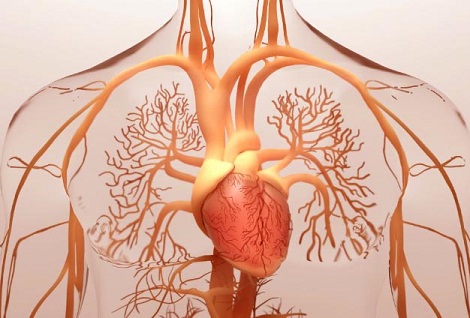Nikhil Prasad Fact checked by:Thailand Medical News Team Aug 22, 2024 1 year, 5 months, 1 week, 3 days, 9 hours, 34 minutes ago
Mpox News: Studies have uncovered that the monkeypox virus (Mpox), traditionally known for causing skin lesions and flu-like symptoms, may also pose a significant risk to heart health. A 2023 study by researchers from Assiut University, Mansoura University, Ain Shams University, and Benha University in Egypt that conducted a systematic review of case reports and series, revealed alarming evidence of cardiac complications in some Mpox patients. This
Mpox News report delves into the findings of that research, shedding light on the potential impact of monkeypox on the heart and exploring the implications for patient care.
 Evidence of cardiac complications in Mpox infections
The Link Between Monkeypox and Cardiac Issues
Evidence of cardiac complications in Mpox infections
The Link Between Monkeypox and Cardiac Issues
Monkeypox, first identified in 1970, has primarily been associated with rashes, fever, and swollen lymph nodes. However, as the virus has spread beyond its endemic regions, new symptoms and complications have emerged. The researchers in this study systematically reviewed nine articles that reported 13 cases of cardiac complications linked to Mpox. These complications included acute myocarditis, pericarditis, pericardial effusion, and myopericarditis, indicating that the virus might have a more profound impact on the body than previously understood.
The study review highlights that among the cases reviewed, several patients reported severe chest pain, often radiating to the left arm, which is a classic sign of heart distress. In many instances, these patients had no prior history of heart disease, and their symptoms appeared shortly after contracting Mpox.
Understanding the Cardiac Complications
The heart-related complications observed in monkeypox patients are concerning and point to the virus's potential to cause significant inflammation in the heart muscle and surrounding tissues. Myocarditis, one of the most frequently reported complications, involves inflammation of the heart muscle, which can weaken the heart and reduce its ability to pump blood effectively. In severe cases, myocarditis can lead to heart failure.
Pericarditis, another condition identified in the study, is characterized by inflammation of the pericardium, the thin sac-like membrane surrounding the heart. This inflammation can lead to the accumulation of fluid around the heart (pericardial effusion), which may compress the heart and impair its function, a condition known as cardiac tamponade.
Treatment Approaches for Cardiac Complications
The study found that the treatment of Mpox-related cardiac issues varied depending on the severity of the symptoms. For cases of pericarditis, colchicine and nonsteroidal anti-inflammatory drugs (NSAIDs) were commonly used to manage inflammation and pain. Patients with myocarditis often received supportive care, including exercise restriction and medications such as Bisoprolol and Ramipril, which help to manage symptoms and protect the heart.
One notable treatment highlighted in the study was the use of Tecovirimat, an antiviral drug initially developed to treat smallpox. Tecovirimat was administered to some pa
tients with severe Mpox symptoms, including those with cardiac complications. While the effectiveness of Tecovirimat in treating monkeypox-related myocarditis and pericarditis remains unclear, its use was associated with improved outcomes in the cases reviewed.
Key Study Findings
The researchers identified several key findings from their systematic review:
-Diverse Cardiac Complications: The study documented a wide range of cardiac issues in monkeypox patients, including myocarditis, pericarditis, and myopericarditis. These conditions often presented with severe chest pain, elevated cardiac markers, and abnormal electrocardiogram (ECG) readings.
-Timing of Symptoms: In many cases, cardiac symptoms appeared within a few days of the onset of Mpox symptoms, suggesting a direct link between the viral infection and heart complications.
-Potential for Severe Outcomes: While most patients recovered with appropriate treatment, the study noted that monkeypox-related cardiac issues could lead to serious outcomes if not promptly diagnosed and managed.
-Importance of Early Diagnosis: The researchers emphasized the need for early cardiovascular assessment in monkeypox patients, especially those presenting with chest pain or other symptoms indicative of heart involvement.
Expanding Our Understanding of Monkeypox
The findings of this study add to the growing body of evidence that monkeypox may have broader implications for human health than initially thought. As the virus continues to spread, understanding its full range of effects, including on the cardiovascular system, is crucial for developing effective treatment protocols and preventing severe outcomes.
The study findings highlight the importance of ongoing research into the mechanisms by which Mpox causes cardiac complications. While the exact pathophysiology remains unclear, the study suggests that the virus may have a direct impact on heart tissue or trigger an immune-mediated response that leads to inflammation and damage.
Conclusion
The study findings provide valuable insights into the potential cardiac complications associated with Mpox. As the global medical community continues to grapple with this emerging virus, it is essential to recognize the diverse ways it can affect the body, including the heart.
For healthcare providers, the findings underscore the importance of monitoring monkeypox patients for signs of cardiac involvement and implementing early interventions when necessary. While the majority of cases may be mild, the potential for severe complications, particularly in those with underlying health conditions, cannot be ignored.
Further research is needed to fully understand the mechanisms driving these complications and to develop targeted treatments that can mitigate the impact of monkeypox on the heart. As we continue to learn more about this virus, staying informed and vigilant will be key to protecting public health.
The study findings were published in the peer-reviewed journal: BMC Cardiovascular Disorders.
https://bmccardiovascdisord.biomedcentral.com/articles/10.1186/s12872-023-03351-3
For the latest
Mpox News, keep on logging to Thailand Medical News.
Read Also:
https://www.thailandmedical.news/news/chinese-researchers-warn-that-current-vaccines-are-inefficient-in-protecting-against-emerging-mpox-virus#google_vignette
https://www.thailandmedical.news/news/up-to-10-percent-of-mpox-infections-could-end-up-in-blindness
https://www.thailandmedical.news/news/breaking-ivermectin-users-will-likely-suffer-severe-or-lethal-mpox-infection-due-to-diminished-interferon-gamma
